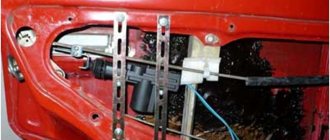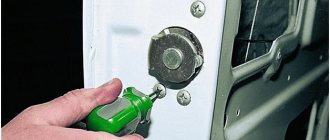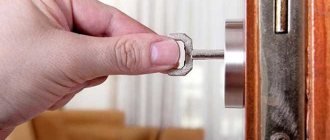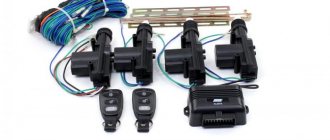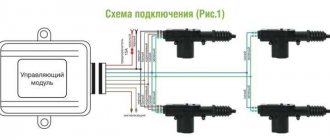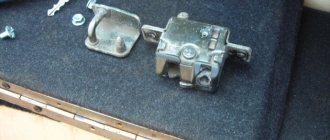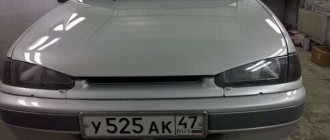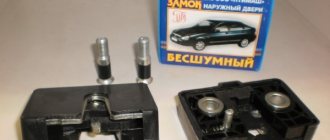Signal and central locking, VAZ-2110
This review discusses how to connect an alarm system to the central locking of the following cars: VAZ-21099, as well as 2110 and 2115. There are three standard connection schemes: for central locking controlled by negative polarity, positive and variable. But different cars have their own nuances. Sometimes it is necessary to add a fuse to the “+12 Volt” wire, sometimes, on the contrary, this is not required. VAZ locks, in turn, belong to the simplest type, the first. But the standard scheme published on the Internet is not suitable for them.
Features of the VAZ central lock
Everyone knows that the Lada models listed here use central locking controlled by negative polarity. This literally means the following: we apply “0 Volt” to one wire - all locks close. We apply the same voltage to the other wire (second) - they unlock. This is done in many European cars. What does it mean to “supply “0 Volt”? This means connecting the wire to ground.
Central locking control unit connector
The central locking control unit has the following wiring:
- Black wire – ground (connected all the time);
- Pink – power supply “+12V” (built-in fuse is used);
- Yellow, red - connected to the actuators in the doors (these wires are not connected to the signaling system!);
- Brown, white - control wires, just those that have already been mentioned.
Let's look at the central locking connection diagram, which is implemented “from the factory”:
Standard connection diagram for central locking
First, we may decide that the triangular connector (labeled “C”) is suitable for our purposes, since it contains control contacts. But please note that the standard circuit uses a microswitch located in the driver's door. We will break two wires coming from this switch, and the relays built into the alarm unit will be connected to the breaks. Other options are excluded.
The fundamental difference between the main types of central locking
We strongly recommend that you leave the solution to problems related to electricity if you do not know the principle of operation and the purpose of the connected batteries. Connecting a central locking system is no exception to this rule.
Fundamentally, devices for automatic unlocking/locking of door locks can be divided into 2 types:
- Central locking with electric drive. Electric activators are installed in the doors. Each mechanism can have an individual control unit or be controlled by a single unit (this is the scheme used on budget cars);
- pneumatic central locking. The activator rod moves due to changes in air pressure inside the line. At the moment, the system is outdated and not used; in the past, such systems were installed by Mercedes, BMW, VW, Audi. It is not economically feasible to restore such a system or install it yourself. It is much easier to install electrical activators by connecting everything to a unit with a remote control function.
Let's make the alarm system and central locking together
Any modern alarm unit is equipped with two relays connected to the central locking control unit. One relay is opening, the second is locking, and the circuit in the general case looks like this:
Control of central locking by supply of “mass”
In our case, the green and white cords coming from the signaling unit will be required, as indicated in the diagram. However, they will not be the only ones needed. We will connect the relay contacts to breaks in the standard wiring. This means there will be not 2, but 4 cords.
The cause of the malfunction of the central locking VAZ 2110
How quickly a person gets used to everything good. It would seem like a central lock
, such a small thing, but to what extent...
Operation of the central locking relay VAZ 2110
This relay can be used in any car, the advantages are ease of installation, as well as low cost of components.
Connection diagram for VAZ central locker
Take another look at the diagram published in the first chapter. We will connect the relay to the gap in the white and brown wires going from the microswitch to the central lock control unit. And it is obvious that it is easier to break these wires near the 8-pin connector. The same one shown at the beginning.
To avoid any questions, we will show you what should happen as a result:
Connection diagram, central lock VAZ
The common contacts are connected to the wires coming out of the microphone. The white cord continues with the brown wire coming from the door, and so on. Normally closed contacts are also used, along with normally open ones. These are the features of connecting to the VAZ central locking system.
An approximate sequence of actions performed by the installer:
- Make and lay a 4-core cable running from the signaling unit to the 8-pin connector;
We have given this sequence to emphasize once again that the relays are switched on between the microphone and the central lock control unit. There is no need to connect any additional devices. As a result, the alarm system will be able to control the state of the locks.
Remember that installation is performed by removing the negative terminal from the battery.
All wires added to the car structure must be protected (use heat-resistant tubes or electrical tape). Twisting is not the worst method to connect two wires. But it's even better to use soldering.
An interesting nuance from practice
It would seem that if a person has experience working with electrical equipment, he can do everything according to the instructions given. As a result, if no mistakes are made, you may encounter an interesting phenomenon. Instead of closing, there will be a short-term locking followed by opening. And vice versa. What to do in this case?
Selecting a security alarm for installation on a domestic car
The function of remotely closing and unlocking all car doors is mandatory for all types of modern anti-theft alarms. It is impossible to install an alarm without a central lock, so car owners are forced to install a central lock before purchasing a security system.
The trade offers motorists hundreds of models of anti-theft alarms in a wide price and functional range.
When choosing a car alarm for installation on domestic cars, the main selection criteria for car owners are:
- Affordable security system price. Experienced car enthusiasts do not buy the cheapest anti-theft alarms, doubting their durability and quality of work. Most Russian drivers prefer to buy car alarms from the middle price range.
- System functionality. Ordinary owners of VAZ models consider the car alarm to include a remote key fob, two or three sensors, a siren, and connection cables as a sufficient set of options.
- Possibility of self-installation. To implement this requirement at the purchase stage, you need to be interested in the complexity of the electronic control unit for the security system, detailed diagrams and instructions for connecting the anti-theft alarm. When installing it yourself, minimal disruption to the standard electrical wiring is desirable; it is not recommended to interfere with the operation of existing mechanisms.
Owners of VAZ-made models do not need to worry about the difficulties of flashing factory protections or bypassing standard immobilizers. However, experts do not recommend that novice car tuning enthusiasts begin work by independently installing security systems equipped with:
- remote engine start (remote engine start based on temperature, timer);
- coded dialogue communication system, GSM modules;
- numerous additional options (starting from a smartphone, turning on heaters, air conditioners).
If you want to install a full set of security options on a VAZ model, you will have to contact a specialized service, where they can install additional equipment.
The easiest way to install a simple car alarm with a minimum set of functions on your own.
On sale you will find dozens of simple anti-theft car alarms that are available for self-installation on VAZ models; all you have to do is choose the ones that are suitable for the price and set of functions.
What kind of malfunctions can there be?
When closing the lock on the door, no other actions are noted. But if you even slightly need to try to open it with the key, the door can open immediately. The presence of malfunctions is immediately visible here. The main ones can be highlighted. The central lock opens and closes itself on a VAZ - this is a normal state of affairs, but if it is faulty
The contact does not open in the central locking drive
The contacts do not open in a timely manner, and this occurs due to the following reasons:
- Traction control. Structurally, it works like this: the lock button and the drive are connected together. In this case, the rod acquires the wrong position, and there is no contact with the electric drive.
- When the button touches part of the casing. The element is not lowered to the required depth in order to contact the electric drive and the traction. There are no signals to other doors.
If there are problems of this kind, you need to make sure that the position of the button is fixed at the very end. If this is not observed, then it is worth checking the casing and making sure that there are no scuffs, only then pay attention to the ideal, even and accurate position of the rod.
Fuse failure
If the central locking on a VAZ does not work, then the cause of this circumstance may be a blown fuse. If the driver tried to open the door, but this did not lead to the desired result, then you need to look at how the electrical circuit works, and more specifically, the fuse. This element can quickly fail and the cause will be not only a short circuit, but also even the smallest load.
Fuse failure
The location of the thrust when operating a car in winter results in an overload on the engine elements.
Violation of the integrity of the central locking wires
If the central locking on a VAZ does not work, this may occur as a result of a broken section of wires. This is the main reason, since the fracture is observed in those places where the load on the node is greatest. This place is the passage of the corrugation from the side of the door and the counter. When opening a car door, the main part of the load occurs in this mechanism.
Violation of the integrity of the central locking wires
- It is easy to determine the location of the fault; you need to release one of the ends of the corrugated element in which the wires are concentrated inside the door, and then tighten one of the central locking wires. Their constructive connection is into a single bundle, and also next to each other.
- After doing some simple work, a damaged wire due to damage or interruption will be easy to repair.
- Once a fault within the circuit is confirmed, replacement will be easy. To do this, it is enough to cut out the faulty section and replace it with a new one; just twist the ends of the wires together and then insulate them.
- If it is difficult to visually determine where the wires are broken, you can always use a multimeter. The device will accurately indicate the location of the fault and the owner will carry out repairs without any problems.
When the central locking unit burns out
On the VAZ 2110 the buzzer stopped working, the reason for this may be a break in the central lock, or more specifically, a burnout of its separate unit. To carry out troubleshooting work, you need to use a multimeter. In this way, it will be possible to determine the presence of voltage at the contacts.
Who can you trust to install an anti-theft device?
There are the following options for installing an alarm on a VAZ 2110:
When installing this security system yourself, you must have certain knowledge and skills in the field of electronics and car design. The same requirements apply to friends, colleagues and acquaintances involved in these technological operations. The most successful option would be to shell out 2 – 2.5 thousand rubles and contact specialists in order to avoid failure or incorrect installation of fairly expensive equipment.
Some technical features of choosing a car alarm for a VAZ 2110
The anti-theft device must be selected with power outputs for direction indicators, repeaters and side light indicators. Such outputs are not suitable for low currents; there is a high probability of wiring burnout. If the system is structurally equipped with one power wire, then we select the side lights as the alarm indicator; if there are two wires, we connect the turn indicators and their repeaters on the wings. Such a security device must also have power outputs for the door locks. A pulse value of 0.8 s is sufficient for a VAZ 2110. A good car alarm for a VAZ 2110, a photo of which is posted on our website, should have different buttons for turning on and off the “anti-theft”; it is recommended to select a system with a dynamically changing radio pulse code, which negates the scanning recording the code of car opening by car thieves. We choose an ordinary, autonomous type of sound siren; for security alarm systems with reverse scanning, an isolated monotone siren with a power of 20 W is required.
LCD key fob for car alarm StarLine
Tools required to install a car alarm on a VAZ 2110
These tools include:
- Phillips head screwdriver
- Wrench or 10mm socket with wrench for ease of use
- A mechanic's knife (scalpel) and a lighter for stripping wiring
- Black impregnated fabric insulating tape with a fresh sticky surface
- Double-sided tape.
- Foam rubber, which is necessary to protect the control unit from mechanical damage and shock absorption during movement, is preferably dark in color
- Multimeter and skills to use it
- Selected car alarm for VAZ 2110, instructions for use are included
Selecting a location for installing a security device
During this procedure, fulfill the following conditions:
- Find a secret place to install the control unit in the car
- Do not install the control unit near heat sources and liquid filling equipment (heating and air conditioning systems)
- Do not install the control unit near active devices for receiving and transmitting radio waves (stations, auxiliary equipment, power wiring, etc.)
- The main requirement is that the wires are long enough to connect to the necessary devices.
- The control unit should be located as secretly as possible, in a hard-to-reach place
Car alarm control unit
We believe that it is better to attach the control unit to the instrument panel, having previously covered it with foam rubber cloth and leave open spaces for connectors.
About the operation of the central lock
Where is the central lock on the VAZ 2110 and how does it work? The purpose of the drive is not only for the lock, but also for transmitting a signal to the installed unit. Afterwards the commands are transmitted to other doors.
The multifunctional drive must have five wires, and additional contacts are needed to communicate with the car control. How to connect the central locking on a VAZ 2110, just use a simple diagram.
You begin to appreciate many things after they are gone. The same applies to the additional options of the VAZ 2110. Central locking (CL), for example, you can not notice as long as it works properly or you can do without it altogether. But you quickly get used to good things, don’t you? Therefore, when something that provides us with a comfortable ride fails, you immediately begin to rush around in search of answers “how to fix it.”
Central locking device VAZ 2110
VAZ cars are not least good for their high maintainability. Whenever something happens to your iron horse, you can almost certainly solve the problem yourself without the help of specialists at a service station. “Ten” was no exception in this regard.
As for the central locking system specifically on Lada 110 cars, this is really a rich topic for discussion. Ignorance of elementary circuits and the operating principle of the unit can confuse many motorists. However, servicing the mechanism is quite simple. And given the enviable frequency of its failure, it turns out that knowing “how” is simply vital.
Typical problems and their solutions
Electronic anti-theft systems of a car are subject to breakdowns and various types of malfunctions. In some cases, technical problems that arise can be resolved independently.
First of all, due to incorrect placement of additional shock and volume sensors, they may malfunction, and the alarm will go off without obvious reasons. An alarm that constantly goes off when the car owner is absent for a long time can completely discharge the battery and deprive the owner of the opportunity to start the engine. To eliminate this problem, it is recommended to check the correct placement and connection of the shock and volume sensors and, if necessary, reconnect them in accordance with the rules. Replace faulty sensors.
The alarm may not work correctly due to a large amount of interference interfering with the operation of the remote control. There are several solutions to solve this problem:
- Each time, bring the control panel as close as possible to the alarm unit or press the desired button several times.
- Reboot the alarm several times. To do this, just remove the power cable from the battery terminal for a few minutes, put it on and repeat the procedure 2-3 times.
- If possible, change the permanent parking location of the car, away from sources of interference.
If the anti-theft system does not respond to commands from the remote control, you should start troubleshooting the possible problem with the key fob. If commands from the key fob are well received up close, but do not work from a long distance, it means that the internal battery on the remote control has run out. You can replace it yourself.
Many remote controls have a battery charge indicator. If there is no such indicator, it is recommended to start fixing the problem by replacing the battery or charging the key fob.
If the remote control does not function with a fully charged battery, you need to check the alarm operation using a spare remote control. It is possible that the remote control itself is faulty. If the spare key fob controls the anti-theft system well, then it is recommended to replace the main one.
In cases where independent actions do not help to establish the operation of the anti-theft system, it is recommended to contact the service department.
This review discusses how to connect an alarm system to the central locking of the following cars: VAZ-21099, as well as 2110 and 2115. There are three standard connection schemes: for central locking controlled by negative polarity, positive and variable. But different cars have their own nuances. Sometimes it is necessary to add a fuse to the “+12 Volt” wire, sometimes, on the contrary, this is not required. VAZ locks, in turn, belong to the simplest type, the first. But the standard scheme published on the Internet is not suitable for them.
What is the central locking on the VAZ 2110?
The purpose of this type of device is to centrally control the automatic mechanism for opening and closing all doors in the car at once. This is especially convenient for working in conjunction with an alarm system and when operating a car in general. However, the reliability of the operation of the central locking system should definitely be checked every time by moving the handles of all four doors before going about your business for a long time, since the actuator can often fail and one of the doors may remain unlocked.
Structurally, the VAZ 2110 central lock consists of the following elements:
- electronic transistor control unit;
- gearmotor actuators, also known as activators (one for each door);
- a limit switch that determines the current state of the door (open or closed);
- electrical wiring and other installation elements.
Central locking diagram for VAZ 2110
Repair features
As a rule, in the event of a central locking malfunction, experienced electricians first check the condition of the sensors. If the central locking system is connected to the anti-theft system, then it is this system that is checked first. As stated above, activators most often fail, so they should also be checked.
If a certain door refuses to work, the reason must be found in it. This could be the solenoid itself or the wires. During the operation of the car and the frequent opening and closing of doors, a break in the wiring circuit may occur due to kinking and mechanical breakdown of the wire itself. If this is the case, then the wire needs to be replaced or the broken parts reconnected, and then insulated.
Sorry, there are no surveys available at this time.
Why the central locking on the VAZ 2110 does not work correctly
The problem of improper operation of the actuator is not at all uncommon for cars in the domestic automobile industry. Despite the fact that there are a number of reasons for the failure of mechanism parts, the principle of operation of the automatic door closing system is quite simple, and the malfunctions are very typical in their entirety. This means that any motorist can deal with them.
You don’t have to grab your head and run to the workshop in search of a qualified specialist. Thanks to the diagnostic recommendations below, you yourself are very likely to become one. If, for some reason, you don’t want to get your hands dirty, at least no one else will dare to mess with you. And this, you see, also costs a lot.
preparation of the site and description of the procedure connection diagram AutoNovator
Removal and installation of the fuel rail and fuel regulator VAZ 2110, VAZ 2111, VAZ 2112, Lada DesyatkaRemoval and installation of the fuel rail and fuel regulator VAZ 2110, VAZ 2111, VAZ Lada, 2112 Ten
Central locking is usually considered an additional option for cars, but nowadays most cars are equipped with it even in the basic configuration.
Preparing a site for installing a central lock
The main purpose of the central lock is to automatically open and close several doors in a car at the same time. Structurally, it is a mechanism connecting switches, sensors, and wires. The lock can be controlled either by a key or by an alarm key fob.
You can get invaluable benefits from central locking when you carry children in the back seat of a car. We all know what pranksters they can be sometimes, imagine the situation if they open the door while walking. We think there is no point in talking about the consequences, since they are obvious. Drivers often encounter the tricks of thieves who steal valuables from the back seats of cars stuck in traffic. Thus, central locking is not just a useful, but the most necessary option. As has already been said, most cars are equipped with it even in the basic configuration, however, there are the lion’s share of cars where this option is missing, so we decided today to correct this situation and install the central locking ourselves, besides, if we have the necessary tools, desire and time, this everyone can do it.
At the very beginning of the work, you need to remove the door trim, so do not forget to buy in advance a set of plastic latches with which it is secured, since they are disposable, and at the end of the procedure you will have to change them. It would also be a good idea to disconnect the terminals from the battery, since working with electrical wiring requires compliance with safety precautions.
After the trim and dust curtain have been removed, you need to choose a place to install the mechanism, taking into account the location of the insides of the window regulator and the movement of the glass. It is possible that you will have to make an additional bracket for attaching the central lock.
Installation of central locking
Well, the place for the lock mechanism has been chosen, you can attach it, for this you will need self-tapping screws. For correct operation, after installation, you must pair the central lock with the lock rod, which is responsible for lowering and raising the door lock button. For the most accurate fit, it is not forbidden to bend the rod. Now you need to check the movement of the mating parts, it should be light and smooth.
The next step in installing the central locking system is the wiring - pull the necessary wires through the corrugated pipe located between the door and the body pillar, which protects the wires from chafing. Following the attached instructions, connect the wires to the alarm unit.
Almost everything is ready! Now you need to check the functionality of both the mechanical and electrical parts of the installed mechanism; before doing this, do not forget to connect the battery. After making sure that everything is working properly, you should restore the casing in the reverse order indicated above and enjoy the result.
Central locking will make your driving life easier, more comfortable and safer. However, in order to avoid troubles, you should know that some such gadgets are equipped with additional options, for example, sometimes after 10 minutes the lock automatically closes all the doors, this is good if you forgot to lock the car, but bad if you also left the keys in the car. Sometimes the central locking closes the doors as soon as the driver starts the engine and presses the brake (this is more common in cars with automatic transmission).
In any case, no matter what new thing you bring to the car, be it installing an alarm system, installing parking sensors or other pleasant needs, remember about safety precautions, this will not only add comfort, but also protect you from troubles.
Problems in the operation of the activator electric drive
The central locking actuator is quite fragile and does not tolerate overload. The activator body, made of plastic, can easily melt if the frequency of door closing is excessively high. The duration of the control pulse also plays an equally important role. Try to always remember about the extreme fragility of the activator and not to load it during operation.
It is easy to guess that the activator is located in each individual door of the car. If the body of one of them melts due to overheating of the electric drive commutator, this becomes the cause of many problems:
- the activator on individual doors stops functioning;
- Constant overloads in a jammed electric drive cause the fuse to fail.
The actuator mechanism is entirely made of plastic. Gears can easily wear out and break during operation, or melt when the commutator overheats. As a result, when the central locking operates, characteristic creaking sounds are heard - a sure sign of imminent failure of the activators. Likewise, if the gearbox of the mechanism is humming, but the doors do not open or close.
Breakdowns in the wiring
The next important element of the entire system is electrical wiring. The operation of the central lock depends on its condition. If there are abrasions on the wires or cuts, this will inevitably lead to either spontaneous activation of the activators or to their inoperability. Most often, the wiring is destroyed at the bends - between the door and the body. To check the integrity, you need to test each wire separately. Just remember to turn off the power, otherwise you will damage the multimeter.
Problem in the operation of the central locking electrical circuit on VAZ cars
The first possible problem follows smoothly from those mentioned in the previous section. Overload in the operation of activators leads to an increase in the operating current in the supply circuit above the rated value. As a result, the fuse blows and the central locking of the VAZ 2110 simply “dies”.
It is by checking the fuse that the diagnosis of central locking malfunctions begins. By the way, it is located in a very specific place and it is not easy to find it right away even if you know where to look. In order to get to it, you will need to fold back the central panel with the fuses and dig into the entire wiring harness in the niche that opens behind it. The “comrade” you need is packaged in a special plastic cup and connected to the pink wire.
Central locking unit VAZ 2110
Another very common and obvious problem is the central locking connector. It is located in the most unfavorable place for this in the interior body, under the foot mat. A large amount of moisture and dirt inevitably gets there. Electrical contacts are intensively oxidized. As a result, the power supply circuit involuntarily breaks at the point where the plug connector is connected.
Installation instructions
System connection diagram
Installing a central lock in your car is done as follows:
First you need to disconnect the battery and dismantle the car door trim and dismantle the power windows. Having done this, you need to choose a place to install the activator
This element can be installed in any position; it is important that there is plenty of space for the device to operate so that the draft can pass freely. It should also be taken into account that the rod should be connected most conveniently. The activator must be mounted on the most flat surface
If you allow even a slight misalignment, which can occur as a result of fixing the device on an uneven surface, this can cause difficulties in the operation of the gear shafts. When installing the device, you will need to use washers or bushings to ensure leveling of the surface. If the element gets into a hole in the metal of the door, a special plate should be included with the activator; use it. Since the design of the “ten” doors is unique, the rod itself must be bent correctly before installation. The bend angle itself should be minimal and preferably the most precise. If the angle is close to the arc itself or the distance from the rod to the element lock is too large, problems will arise in the operation of the central locking system. The system will not increase power to move the rod, but will give this force to overcome the bend of the arc. After installing this element, wires are laid from each door to the place where the control unit will be installed. Wires should be routed at the bottom of the doors so that they are not exposed to power windows or other moving body components. The wires at the connection points must be well insulated, otherwise moisture may cause the system to short out. To lay the wiring between the doors and the body, there are special rubber corrugations - the wires need to be routed through them. When laying wires in the doors, make sure that they do not break when closing. The next step is to install the block. As a rule, the unit is placed either behind the center console or in the car door. It must be taken into account that the block must be located in a place that is difficult to reach for an attacker, but this place must be dry and protected from moisture. Therefore, if you decide to install the central locking unit in the door, then under no circumstances should you place it below, since moisture and dirt usually accumulate here
After some time of operation, these factors will lead to the fact that the unit will not be able to work normally. Also, when installing the unit, pay attention to the fact that its operation should not be interfered with by the window regulators, and the unit itself should not interfere with them. After installing the unit, the wiring is connected; for this, the connection diagram for the VAZ 2110 central locking is used, which should come complete with the system. After connecting, check whether the central locking system is working correctly. If the solenoid does not have enough force to open the rods, you need to find the cause and get rid of the malfunction (the author of the video is the SIMPLE THINGS channel)
Problem with the operation of the VAZ-2110 central locking control unit
Electronics, of course, are reliable things. Modern control modules for the central locking VAZ 2110 are assembled using a transistor control circuit. This eliminates their mechanical wear. The shelf life of key components is measured in tens of years. The control unit is located under the plastic dashboard cover on the right side of the driver's seat.
However, power transistors can easily fail when the activators are overloaded and the collector is short-circuited. It may even happen that the signal from the control unit will constantly be sent to the lock drive if the transistor is broken. Otherwise, it will simply not turn on.
Checking the control unit is extremely simple. The voltage from the negative terminal of the battery, or directly from the pink wire supplying the control unit, is supplied to the contacts of the gearmotor (activator) in series to the red and yellow conductors. All of the above contacts can be found directly on the eight-pin connector of the control unit.
Thanks for subscribing!
Also, the control unit may issue erroneous control commands due to incorrect operation of the limit sensor. Being a mechanical device, the main door switch can simply wear out. As a result, the control unit simply will not be able to function correctly, since it will not know in what position the car doors are currently located, whether the driver's door lock is closed or open.
Design and principle of operation
The alarm control unit is the central element in the entire anti-theft system, interacting between all sensors and anti-theft subsystems. A control unit was built based on a central microprocessor that receives signals from sensors and control panels, processes information from them and makes decisions on further actions according to a pre-programmed algorithm of actions.
When installing an anti-theft system, security sensors are built into different parts of the car that detect vibrations, impacts and other external influences on the car. When information about an unusual situation is received from such sensors, an electronic signal is transmitted to the control unit. After processing this signal, the central processor turns on a sound and light alert about an attempted theft, transmits information to the control panel, and blocks those locks that were not closed at the time of operation.
When a coded signal is received from the remote control, the central processor can turn the car's security mode on or off, while locking or unlocking the car's doors and trunk.
The alarm control unit is equipped with a permanent storage device - a hard disk memory that can store information even in the absence of power. This is necessary so that in any situation all the standard settings and codes that are needed to disarm the car and arm it are saved.
How well do central locking and alarm systems work together in VAZ-2110 cars?
As you know, a modern alarm system involves autonomous control of all opening parts of the car. For this reason, it is possible to connect the VAZ 2110 central locking system to the alarm system. The connection diagram for the signaling device is included in the operating instructions for the device. The central locking control circuit also seems to have an additional unused connector for this purpose.
However, in reality it is not so simple. Control signals from the alarm system to the central locking system will conflict with the information received from the limit switch installed in the driver's door. For this reason, the standard central locking control circuit with which VAZ 2110 cars are supplied from the factory should be slightly altered.
The essence of the modification is extremely simple. According to the circuit diagram, the limit switch is connected to the eight-pin connector of the central locking control unit via two wires: brown and white. These wires from the unit should be disconnected.
Now the limit switch will be connected to the alarm control circuit, and the alarm will set control signals to the electronic unit of the central locking. Perhaps the diagram described “on fingers” may seem somewhat incomprehensible to you. But it will be very easy to understand the above by studying the diagram proposed below.
Central lock VAZ 2110
To better understand the idea of connecting an alarm, it is still worth studying the instructions included with it. Thanks to this, you will have a clear idea of how to implement this idea in practice. But the essence of the connection will remain the same. The work requires minimal effort and is generally very simple.
Where is the alarm unit located?
The block of the anti-theft complex can be located anywhere in the car, because when installing a security system, installers are guided by the rule: the block is placed in a place inaccessible to intruders, otherwise the anti-theft system will not be able to perform its function.
Locate car alarms in typical locations where they are most often installed by professionals. The alarm is usually installed and placed inside the cabin.
To find an alarm in your car, it is recommended that you first look under the dashboard. Automakers often leave enough space underneath to install additional equipment. This installation method is also convenient because power is supplied to the dashboard from the battery.
In some cases, the alarm unit is installed under the inner trim of the driver's door. You can also find the unit under the front passenger door interior panel. You can look under the panel located near the handbrake. Installers rarely install an anti-theft system near the clutch, since this mechanism operates quite often and can damage the anti-theft wires. For the same reasons, the anti-theft system unit is rarely installed in the engine compartment.
You can look for the block under the driver's seat. This installation location is sometimes chosen by motorists who install anti-theft devices themselves. Professional installers will not install the unit in such a place.
If the car is equipped with standard anti-theft electronics, the location of its installation is described in the car's operating instructions.
What does it look like
The power supply can have a very different appearance. In most cases, it looks like a small rectangular box made of black plastic with a lot of wires attached to it.
Practical connection operations
To install a car anti-theft alarm you will need simple tools and materials:
- screwdrivers, wrenches (special pullers are not needed to dismantle interior elements of VAZ models);
- soldering iron and soldering accessories (solder, acid);
- multi-colored single-core cables (selected according to the colors of the standard electrical wiring or the pinout of a specific electrical circuit);
- linear meters and multimeter;
- insulating materials;
- fastening elements (special plastic clips are preferred).
The easiest way to find the central locking control unit is when installing the main car alarm control unit. For example, on the VAZ 2110 it is located rather inconveniently.
Most often, for the convenience of installing alarm elements, you have to completely disassemble the dashboard, door cards, remove the trunk upholstery, and disassemble electrical devices of lighting systems.
During installation, it is convenient to use wires of the same colors as those coming from the central locking control unit.
Having disassembled the door card, you can connect the control wires directly to the electric drive of the lock.
It depends on the car alarm model whether you need to purchase additional relays. Sometimes standard fuses and power switches may not withstand the additional load.
The easiest way to connect a car alarm to the central locks of VAZ models is to solder into the wire breaks (usually white and brown). To do this, you need to lay a four-wire cable from the two internal relays of the alarm unit to the eight-pin connector for controlling the door microswitches.
To avoid oxidation and damage to the integrity of the wires (this leads to false alarms), you must follow simple rules:
- carry out electrical installation work with the battery disconnected;
- connect electrical wiring only by soldering or terminals, insulate connections;
- use cables with a small margin in length, lay them in bundles, and securely fasten them to body elements;
- Observe the color of the cables for easy identification during alterations or repairs.
After completing the electrical installation work, do not rush to reinstall the removed parts. The final assembly of interior elements, doors, trim is carried out only after installing all elements of the anti-theft alarm system, making adjustments, and checking the functionality of the security system.
You can see in detail how to connect the alarm system to the central locking on a VAZ 2110 in the video:
Main components
The central lock (VAZ-2110) has the following components in its design:
- Semiconductor control unit for electric drives.
- The actuators are geared motors (4 in total - one for each lock, but if there is a drive to unlock the trunk, then five). These are small electric motors with gearboxes on the rotors.
- Limit switch that allows you to determine the state of the lock (installed in the gear motor mounted in the driver's door).
- Wires, connections, fuse.
The VAZ-2110 central lock can operate in several modes:
- All locks are activated when the driver's door is unlocked/locked.
- When arming and disarming a car alarm. Provided that the alarm and central locking control units have been connected.
- If there is a function for remote control of the central locking from the key fob. Such control systems have a fairly low cost and can be used on cars without an alarm system.
Causes of activator failures
Almost all activator components are made of plastic. It is quite durable and can withstand heavy loads. But there are also defects and lock malfunctions. In the latter case, there is a sharp increase in the load on the motor, the gears can break down and become disengaged. The lock will buzz, but the flags will not go down (or up, depending on the current state).
But such a manifestation of breakdowns can also be caused by incorrect installation. This is only the case if work has taken place relatively recently, directly or indirectly affecting the elements of the central lock. Failure to adjust the rods is the first sign that the entire system will not work correctly. The lock on which the adjustment is incorrect will not work, while the others function properly.
Possible problems with the locking system
As we know, any equipment fails sooner or later. And the central locking on the VAZ 2110 is no exception. There are a number of problems that manifest themselves in the operation of this system.
Many motorists inadvertently destroy their car's security system. The driver must not give a long or rapid impulse when requesting a door to be opened or closed.
Central locking diagram for VAZ 2110
A fuse protects the central locking circuit. It is from this point that they begin to search for faults in the operation of the entire circuit. It is located inside the car, behind the fuse box. According to the diagram, it is located at the break of the pink wire (in insulation). Under the driver's mat there is a wire with a plug connector, which accumulates moisture and oxidizes. The power supply to the activator is lost.
The modular central locking unit may break. You should check its functionality by applying voltage from the battery to the module connector contact. The gear activator gears are made of plastic. Such parts are subject to wear and tear and this is a mechanical failure.
But the solenoid is considered the weakest point of the central lock; most often it is the one that fails. The electromagnet is controlled via a switch. When opening and closing doors, the life of the solenoids is calculated for approximately 10 thousand operations. After this number of switchings, malfunctions begin. The repair is simple: you need to replace the solenoid itself.
Almost connected the alarm, there was a problem connecting the central locking. On the standard block of the VAZ-2110 central lock there are free 6 and 8 contacts. Is this control and what polarity is it controlled by?
can you tell me where it is located?
I installed the signaling system - I was looking for the central locking unit, I looked everywhere, but I couldn’t find it. I got out of the situation by finding wires in the harness from the central locking control. Control - with negative polarity (at least for me)
2002-04-29 11:05
Re: Can you tell me where it is?
The central locking unit is located next to the engine control unit, a little higher, closer to the radio. There is also a standard immobilizer nearby.
2002-04-29 12:43
Re: Control of central locking VAZ-2110?
In my opinion, you need to connect the alarm to the brown and white wires. I don’t remember which one is responsible for opening and which one is responsible for closing. Central locking refers to a three-wire system with negative polarity.
2002-04-29 12:40
Listen here
